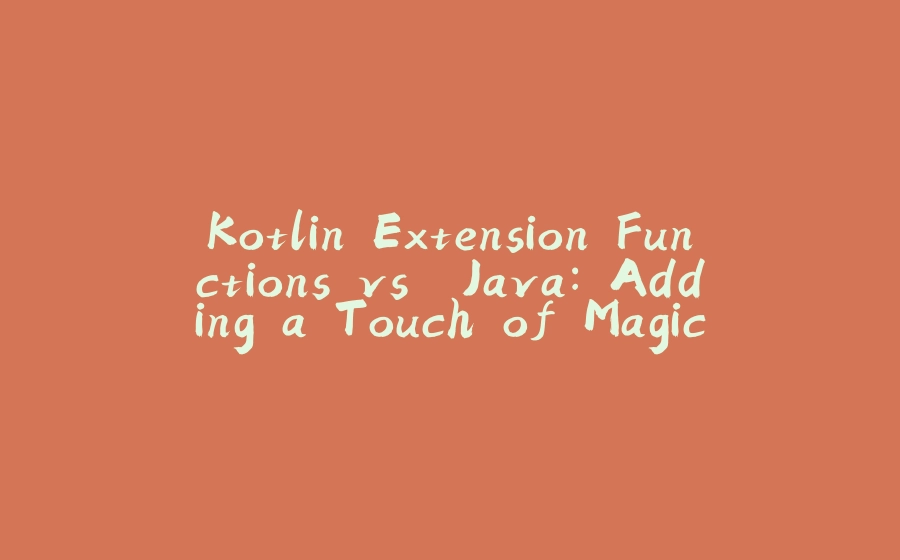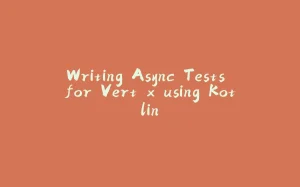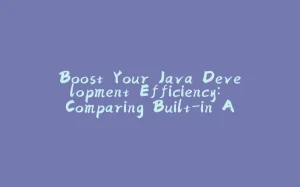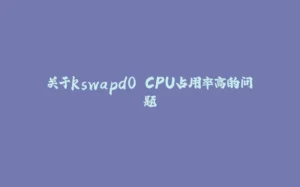Kotlin vs Java (21 Part Series)
1 Kotlin Null Safety vs. Java: A Comedy of Errors (But Mostly in Java)
2 Kotlin Data Classes vs Java: A Tale of Two Cities (But One Has Way Less Boilerplate)
… 17 more parts…
3 Kotlin Properties vs. Java Fields: A Tale of Two Variables (Where Kotlin Has More Tricks Up Its Sleeve!)
4 Kotlin Coroutines vs. Java Threads: A Concurrency Conundrum (Solved with a Sprinkle of Kotlin Magic!)
5 Kotlin Smart Casts vs. Java Casts: A Type-Safe Tale (with Fewer Runtime Surprises!)
6 Kotlin Type Inference vs. Java: A Deductive Dance (Where Kotlin Takes the Lead!)
7 Kotlin Primary Constructors vs. Java Constructors: A Construction Conundrum (Solved with Kotlin’s Elegance!)
8 Kotlin Operator Overloading vs. Java: A Mathematical Magic Show (Where Kotlin Bends the Rules!)
9 Kotlin String Templates vs. Java String Concatenation: A Tale of Two Strings (Where Kotlin Sings!)
10 Kotlin Sealed Classes vs. Java Enums (and Sealed Interfaces!): A Tale of Limited Hierarchies
11 Kotlin Companion Objects vs. Java Static Members: A Tale of Two Companions (Where Kotlin Offers More Than Just Friendship!)
12 Kotlin Infix Functions vs. Java: A Grammatical Twist (Where Kotlin Breaks the Rules!)
13 Kotlin Delegated Properties vs. Java: A Tale of Shared Responsibilities (Where Kotlin Lightens the Load!)
14 Kotlin Range Expressions vs. Java: A Journey Through the Numerical Landscape (Where Kotlin Takes a Scenic Route!)
15 Kotlin Destructuring Declarations vs. Java: Unpacking the Joy of Multiple Assignments (Where Kotlin Delivers the Goods!)
16 Kotlin Lambdas with Receivers vs. Java: A Code Symphony (Where Kotlin Plays a Different Tune!)
17 Kotlin’s “No Checked Exceptions” Policy vs. Java: A Tale of Two Error-Handling Philosophies
18 Kotlin Tail Recursion Optimization vs. Java: A Deep Dive into Efficient Recursion
19 Kotlin Extension Functions vs. Java: Adding a Touch of Magic to Existing Classes
20 Kotlin Object Declarations vs. Java: Summoning Singletons with Ease
21 Kotlin vs. Java: A Grand Finale and Farewell (But Not Goodbye!)
Imagine you’re a wizard with the power to enhance ordinary objects with extraordinary abilities. You can make a simple rock levitate, a broom sweep the floor on its own, or a book read itself aloud. In the programming world, that’s the power of Kotlin extension functions! They allow you to add new functionalities to existing classes without modifying their source code, like adding spells to mundane objects.
Java: The Traditional Enchanter
In Java, if you want to add new behavior to a class, you typically have to create a new subclass or a utility class with static methods. It’s like having to create a whole new enchanted object instead of just adding a spell to an existing one.
<span>// Java</span><span>public</span> <span>class</span> <span>Rock</span> <span>{</span><span>// ... existing Rock class methods ...</span><span>}</span><span>public</span> <span>class</span> <span>RockUtils</span> <span>{</span><span>public</span> <span>static</span> <span>void</span> <span>levitate</span><span>(</span><span>Rock</span> <span>rock</span><span>)</span> <span>{</span><span>// ... code to make the rock levitate ...</span><span>}</span><span>}</span><span>Rock</span> <span>rock</span> <span>=</span> <span>new</span> <span>Rock</span><span>();</span><span>RockUtils</span><span>.</span><span>levitate</span><span>(</span><span>rock</span><span>);</span> <span>// Calling the utility method</span><span>// Java</span> <span>public</span> <span>class</span> <span>Rock</span> <span>{</span> <span>// ... existing Rock class methods ...</span> <span>}</span> <span>public</span> <span>class</span> <span>RockUtils</span> <span>{</span> <span>public</span> <span>static</span> <span>void</span> <span>levitate</span><span>(</span><span>Rock</span> <span>rock</span><span>)</span> <span>{</span> <span>// ... code to make the rock levitate ...</span> <span>}</span> <span>}</span> <span>Rock</span> <span>rock</span> <span>=</span> <span>new</span> <span>Rock</span><span>();</span> <span>RockUtils</span><span>.</span><span>levitate</span><span>(</span><span>rock</span><span>);</span> <span>// Calling the utility method</span>// Java public class Rock { // ... existing Rock class methods ... } public class RockUtils { public static void levitate(Rock rock) { // ... code to make the rock levitate ... } } Rock rock = new Rock(); RockUtils.levitate(rock); // Calling the utility method
Enter fullscreen mode Exit fullscreen mode
This approach can be cumbersome and lead to cluttered code, especially when you have many utility functions for different classes. It’s like having a separate spellbook for every object you want to enchant.
Kotlin: The Spellbinding Innovator
Kotlin extension functions allow you to add new functions to existing classes without modifying their original code. It’s like casting a spell on an object to grant it new abilities.
<span>// Kotlin</span><span>fun</span> <span>Rock</span><span>.</span><span>levitate</span><span>()</span> <span>{</span><span>// ... code to make the rock levitate ...</span><span>}</span><span>val</span> <span>rock</span> <span>=</span> <span>Rock</span><span>()</span><span>rock</span><span>.</span><span>levitate</span><span>()</span> <span>// Calling the extension function</span><span>// Kotlin</span> <span>fun</span> <span>Rock</span><span>.</span><span>levitate</span><span>()</span> <span>{</span> <span>// ... code to make the rock levitate ...</span> <span>}</span> <span>val</span> <span>rock</span> <span>=</span> <span>Rock</span><span>()</span> <span>rock</span><span>.</span><span>levitate</span><span>()</span> <span>// Calling the extension function</span>// Kotlin fun Rock.levitate() { // ... code to make the rock levitate ... } val rock = Rock() rock.levitate() // Calling the extension function
Enter fullscreen mode Exit fullscreen mode
This simple extension function adds a levitate() method to the Rock class, allowing you to call it as if it were a regular member function. It’s like imbuing the rock with the power of levitation with a single incantation.
Why Extension Functions Are So Magical
Kotlin extension functions offer several advantages:
- Enhanced code readability: They make your code more concise and expressive by allowing you to call functions directly on objects.
- Reduced boilerplate: They eliminate the need for utility classes and static methods, keeping your codebase clean and organized.
- Improved code reuse: You can define extension functions once and use them with any instance of the class.
- Increased flexibility: You can even add extension functions to classes from third-party libraries that you cannot modify.
Java’s Counterpart: Static Utility Methods (A Mundane Approach)
In Java, you can achieve similar functionality by using static utility methods. However, this approach lacks the elegance and conciseness of Kotlin’s extension functions. It’s like having to write a separate incantation for every spell, instead of simply imbuing the object with magic.
<span>// Java</span><span>public</span> <span>class</span> <span>Rock</span> <span>{</span><span>// ... existing Rock class methods ...</span><span>}</span><span>public</span> <span>class</span> <span>RockUtils</span> <span>{</span><span>public</span> <span>static</span> <span>void</span> <span>levitate</span><span>(</span><span>Rock</span> <span>rock</span><span>)</span> <span>{</span><span>// ... code to make the rock levitate ...</span><span>}</span><span>}</span><span>Rock</span> <span>rock</span> <span>=</span> <span>new</span> <span>Rock</span><span>();</span><span>RockUtils</span><span>.</span><span>levitate</span><span>(</span><span>rock</span><span>);</span> <span>// Calling the utility method</span><span>// Java</span> <span>public</span> <span>class</span> <span>Rock</span> <span>{</span> <span>// ... existing Rock class methods ...</span> <span>}</span> <span>public</span> <span>class</span> <span>RockUtils</span> <span>{</span> <span>public</span> <span>static</span> <span>void</span> <span>levitate</span><span>(</span><span>Rock</span> <span>rock</span><span>)</span> <span>{</span> <span>// ... code to make the rock levitate ...</span> <span>}</span> <span>}</span> <span>Rock</span> <span>rock</span> <span>=</span> <span>new</span> <span>Rock</span><span>();</span> <span>RockUtils</span><span>.</span><span>levitate</span><span>(</span><span>rock</span><span>);</span> <span>// Calling the utility method</span>// Java public class Rock { // ... existing Rock class methods ... } public class RockUtils { public static void levitate(Rock rock) { // ... code to make the rock levitate ... } } Rock rock = new Rock(); RockUtils.levitate(rock); // Calling the utility method
Enter fullscreen mode Exit fullscreen mode
In Conclusion (The Enchanting Finale)
Kotlin extension functions provide a powerful and elegant way to extend the functionality of existing classes without modifying their source code. They enhance code readability, reduce boilerplate, and promote code reuse. So, if you’re ready to add a touch of magic to your code, embrace the power of extension functions and let Kotlin transform your ordinary classes into extraordinary objects!
P.S. If you’re a Java developer still relying on utility classes and static methods, don’t worry. You can still achieve similar results, but with a bit more effort. It might not be as magical as Kotlin’s extension functions, but it’s a viable option for those who prefer a more traditional approach.
Kotlin vs Java (21 Part Series)
1 Kotlin Null Safety vs. Java: A Comedy of Errors (But Mostly in Java)
2 Kotlin Data Classes vs Java: A Tale of Two Cities (But One Has Way Less Boilerplate)
… 17 more parts…
3 Kotlin Properties vs. Java Fields: A Tale of Two Variables (Where Kotlin Has More Tricks Up Its Sleeve!)
4 Kotlin Coroutines vs. Java Threads: A Concurrency Conundrum (Solved with a Sprinkle of Kotlin Magic!)
5 Kotlin Smart Casts vs. Java Casts: A Type-Safe Tale (with Fewer Runtime Surprises!)
6 Kotlin Type Inference vs. Java: A Deductive Dance (Where Kotlin Takes the Lead!)
7 Kotlin Primary Constructors vs. Java Constructors: A Construction Conundrum (Solved with Kotlin’s Elegance!)
8 Kotlin Operator Overloading vs. Java: A Mathematical Magic Show (Where Kotlin Bends the Rules!)
9 Kotlin String Templates vs. Java String Concatenation: A Tale of Two Strings (Where Kotlin Sings!)
10 Kotlin Sealed Classes vs. Java Enums (and Sealed Interfaces!): A Tale of Limited Hierarchies
11 Kotlin Companion Objects vs. Java Static Members: A Tale of Two Companions (Where Kotlin Offers More Than Just Friendship!)
12 Kotlin Infix Functions vs. Java: A Grammatical Twist (Where Kotlin Breaks the Rules!)
13 Kotlin Delegated Properties vs. Java: A Tale of Shared Responsibilities (Where Kotlin Lightens the Load!)
14 Kotlin Range Expressions vs. Java: A Journey Through the Numerical Landscape (Where Kotlin Takes a Scenic Route!)
15 Kotlin Destructuring Declarations vs. Java: Unpacking the Joy of Multiple Assignments (Where Kotlin Delivers the Goods!)
16 Kotlin Lambdas with Receivers vs. Java: A Code Symphony (Where Kotlin Plays a Different Tune!)
17 Kotlin’s “No Checked Exceptions” Policy vs. Java: A Tale of Two Error-Handling Philosophies
18 Kotlin Tail Recursion Optimization vs. Java: A Deep Dive into Efficient Recursion
19 Kotlin Extension Functions vs. Java: Adding a Touch of Magic to Existing Classes
20 Kotlin Object Declarations vs. Java: Summoning Singletons with Ease
21 Kotlin vs. Java: A Grand Finale and Farewell (But Not Goodbye!)
原文链接:Kotlin Extension Functions vs. Java: Adding a Touch of Magic to Existing Classes



































暂无评论内容